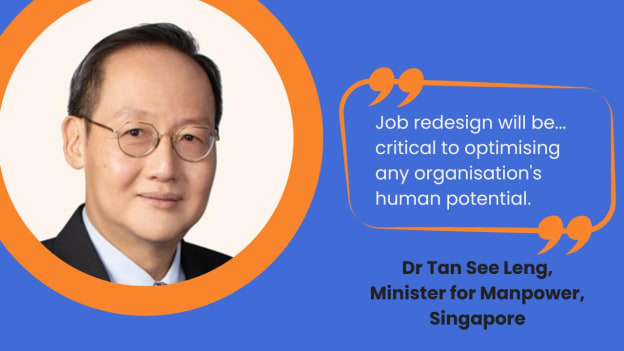HR must have job redesign capabilities, says Singapore's minister for manpower

In a talent landscape where projected economic growth will far outstrip the size of the workforce, where technology is outpacing the capabilities of that workforce, and critically, where that workforce is small and rapidly aging, job redesign takes on fresh importance: aligning business strategy, people strategy, and technology to help organisations keep their competitive edge.
This was the thrust of discussions at the Institute for Human Resource Professionals' People Behind People Forum 2023 this Wednesday, where IHRP also officially launched its new Job Redesign Centre of Excellence in collaboration with Workforce Singapore, the statutory board in charge of workforce upgrading and supporting local employment.
"Beyond digitalisation of HR processes like payroll processing or appraisal management, I strongly encourage HR to support your respective organisations in harnessing the potential of technology to improve your productivity. This means developing capabilities in job redesign," said Dr Tan See Leng, Minister for Manpower, who gave the keynote at the forum. "Job redesign will be needed to make sure that technology is used effectively, with tasks and roles adjusted to fit the changing work environment in a precise manner."
"It will be critical to optimising any organisation's human potential."
In a subsequent fireside chat with Singtel CEO Yuen Kwan Moon and Singtel Chief People Officer Aileen Tan, the minister used the rapid evolution of mobile phones - from the enormous but limited brick-like devices of the 1980s to today's palm-sized computers - as an illustration of how quickly technology, the economy, and workplace expectations are evolving.
"How do we keep up? We constantly learn," he said. "For us, as a worker, as an employee, as long as we have that ability to adapt, to amplify, to augment our learning, and then cope with the accelerated pace of change, I think we will be all right."
But job redesign cannot only be driven by the government, he pointed out - notwithstanding that in Singapore, in-depth changes on such a scale usually need to be kick-started at government level.
"The government can develop a lot of initiatives, put in the resources and the funding, [but for the private sector to have ownership] the businesses and the different industrial economic sectors must see the need and see the wants, what you're going to develop, and what is the endgame," Dr Tan said.
Ideally, he added, as many parties as possible need to be involved in such initiatives, from professional associations to industry bodies to chambers of commerce and even academia, in order to develop more comprehensive pathways for the workers who will actually be on the receiving end of the resulting programmes.
IHRP also announced that it is part of the Ministry of Manpower's new Alliance for Action to help employers expand their access to talent. Co-led by Singtel CPO Aileen Tan, this AFA, said the minister, will support job redesign initiatives by pooling information about needs, pain points, and potential best practices, so that the government can provide more targeted support further down the road.
People Matters is the official media partner for PBP 2023.















